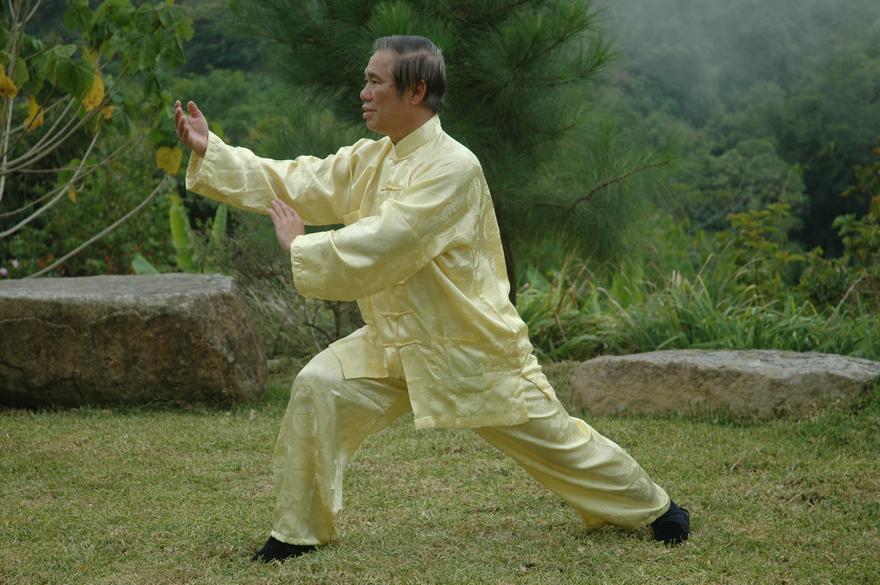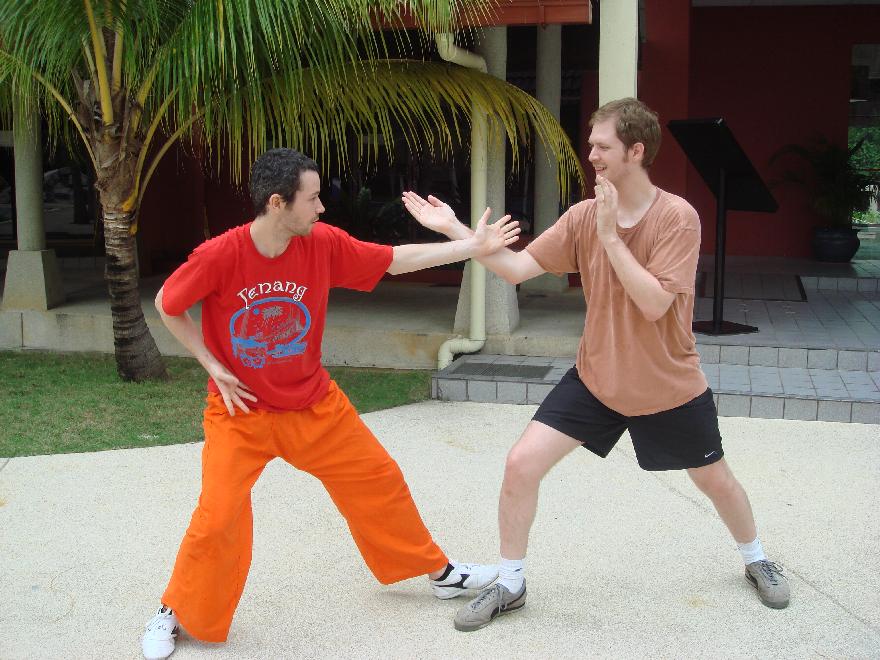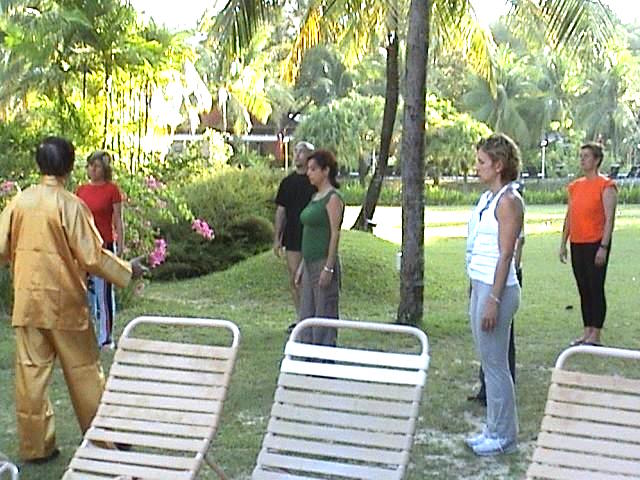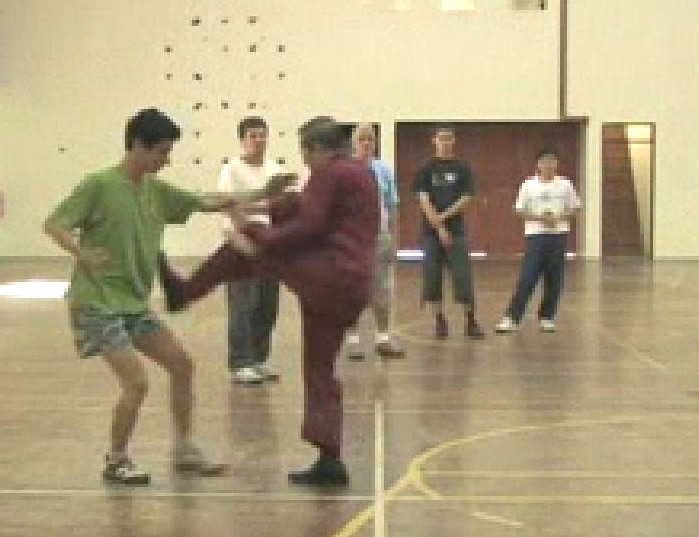SELECTION OF QUESTIONS AND ANSWERS
APRIL 2010 PART 1

A typical Taijiquan pattern, "Immortal Waves Sleeves"
Question 1
I have studied a good number of spiritual classics and martial treatises.
— Scot, USA
Answer
What many students do not realize is that spiritual classics and martial treatises are never meant to be self-teaching manuals. Two main reasons why masters wrote the classics and treatises were to record profound teachings for posterity and to serve as reference texts for their own students. Secondly, spiritual and martial disciplines are arts to be practiced for practical benefits, not just content subjects to be studied for intellectual pleasures.
If you do not have the necessary background knowledge, you will not understand what actually is described even when you know all the dictionary meanings of the words in the description. For example, in the famous Taijiquan Treatise, the great master Wang Zong Yue said that "From Wuji is born Taiji." Even when you know that "Wuji" means the Great Void, and Taiji the Cosmos, you would not really understand what is meant by "From the Great Void is born the Cosmos."
Even if you can intellectually understand this great truth, you will not derive any practical benefit from it. And in any spiritual or martial practice, it is the practical benefit that is important, not just intellectual understanding.
Incidentally, many well-read Taiji practitioners, including some masters, ofen mention this great statement about Taiji issuing from Wuji, which actually defines the philosophy and direction of Taijiquan. But most of them do not know what the words really mean, or derive any practical benefit from this great truth.
Question 2
Judging from what little I know of you and the idea of mine that you strive for excellence in your potential students, I deem this but a test of my resolve.
Answer
Yes, we in Shaolin Wahnam give the best to our students, and are very generous to others who sincerely seek our advice.
But what I have said in my previous replies (please see February 2010 Part 1 and March 2010 Part 1 ) as well as what I am saying here is not to test your resolve, but to explain to you in some detail why your approach is incorrect, and despite your good intentions, you are not only going to waste your time but also contribute to the degradation of the art you ironically wish to promote. Many idealistic young men, especially in the Western world, are in the same category.

Understandably, our claim that our students gain more in 6 months than many others gain in three years may make some people angry, but the claim can easily be verified. For example, our students, like Tom and Chris in the picture, can use kungfu patterns for free sparring after a seven-day course. How many other students can do so after three years of kungfu training?
Question 3
Correct, I am not in any way ready for full time spiritual training, but what humble aspirant is?
Answer
Those who have sincerely renounced worldly life and become monks are ready for full time spiritual training. But even amongst monks, now as well as in the past, not all are really ready. Some are and were forced into monkhood by circumstances, some bought into it, and others for some personal benefits.
Question 4
I attach no results to anything I have achieved though I am determined. I meditate daily, practicing Raja Yoga, and have spent some time daily on Iron Palm practice in addition to regular training from books. I only mention these trifles to show I am not afraid to do the work.
Answer
You make three serious mistakes. In our school, we attach great importance to results. We access how well or otherwise our results meet the aims and objectives of our practice. Do you, for example, have any clear-cut aims and objectives for practicing Raja Yoga and Iron Palm? Do the results meet your aims and objectives?
Secondly, merely willing to do work is not desirable. Doing unnecessary work is unwise. Doing work that is harmful to you or other people is to be avoided. We pride ourselves to be cost-effective. We aim to put in minimum effort to achieve maximum result.
Our claim that our students achieve more in six months than most other people in three years have become a tenet in our school. Understandably, other people become annoyed or angry with our tenet, but that is their business. What is interesting is that since we are quite generous, these people don't bother to find out whether our claim is true and benefit from our experience.
Thirdly, training from books, while possible, is not cost-effective. Sometimes it may be harmful. It is also unwise when you can get better results in shorter time learning from competent teachers, and often with less cost too in the long run. Please note that the comments here are for your situation. For others in different situations, training from books may be excellent.
Isn't it odd that if you are really ready to dedicate your life to the art, you are not willing to learn from competent teachers? If you are honest, you may suddenly realize that it is actually not your vision but just your fancy. Like many other young people, you fancy that you would be a great master saving the world but you are not ready to put in the required sacrifice.

Many students, like those from Portugal shown above, attend a five-day Intensive Chi Kung Course, then return home to practice on their own.
Question 5
My will is to be an external student. I only seek to teach some of what I have experienced to bring others to the path, and I do so with extreme discrimination. Your reputation precedes you and once again it is my honor to receive your correspondence. I will assume it is because you sense some semblance of a piece of potential within me.
Answer
The established tradition to mastership is to train under another master. "Established" means proven over a long time to be valid.
Actually we have a lot of "external" students in our school, but our concept of "external students" is different from yours. Our external students are those who attended my intensive courses and then practice on their own, in contrast with internal students who attend regular classes taught by our certified instructors.
I am sorry your presumption is wrong. To put it bluntly, as you are not even willing to learn personally from our certified instructors or attend my regional or intensive courses, I do not consider you right material for our training.
Moreover, experience has shown that those who want to be teachers even before they are students usually do not have the patience and endurance to last even basic training.
Question 6
"However difficult it may be for the pupil to find a competent teacher, it is manifold more difficult for the teacher to find a competent student."
Answer
While this statement is generally true, we are very glad and proud to say we already have many competent students in our school who will one day become real masters. Some already are.
Many of our students and masters wake up everyday before five to train for an hour or two. Some of them borrow money and travel half the globe to attend my intensive courses. A few of them honestly feel they are not ready and request for more time to prepare themselves when I ask them to become instructors. All of them experience good health and vitality, mental freshness and clarity, joy and zest in their daily work and play, and express much gratitude for having an opportunity to practice such wonderful arts.

It is more difficult for a teacher to find a competent student. We are very lucky in Shaolin Wahnam as we have many competent students.
Question 7
I have since moved from Florida, attend college in Rochester, NY, where I am continuing my practice in much, much colder weather. I've noticed that my academic abilities have improved tremendously since I took my year off from school to learn from Sifu Anthony. This has given me incredible joy.
— Arun, USA
Answer
It has been proven beyond doubt that practicing chi kung improves not only sporting activities but also academic abilities. How is this so? Chi kung is a training of energy and mind.
When we have a lot more of energy and mental freshness and clarity, we shall do better in whatever we do, including sports and studies.Your sifu Sifu Anthony Korahais is an excellent teacher. He will be very proud of you for your good results.
Question 8
I am attending the Rochester Institute of Technology, which has a very large deaf and hard-of-hearing population through the National Technical Institute for the Deaf. Sigung, I am curious. How would you teach a class of deaf students? Since they would be unable to understand your communication without keeping their eyes open, how would you be able to lead them into a Chi Kung State of Mind?
Answer
Students who are deaf will have to read hand language for the instructions. Later, when they can follow the instructions quite well, they may close their eyes during practice.
We can go into a chi kung state of mind even with our eyes open, though for many people at the initiate stage it is easier for them to close their eyes.
When we are proficient, we can be in a chi kung state of mind when we carry on with out everyday activities. There are many levels in the chi kung state of mind. The most fundamental level is to be focused and relaxed at the same time. Hence, when you are focused and relaxed while listening to lectures, writing your assignments, dating a girl, socializing with your friends, or just enjoying your meals, you are in a chi kung state of mind.
Many people don't do this. When someone is speaking to them, they may not be listening but thinking of what to say instead. When they eat their meals, they may not be enjoying it but thinking of what they are going to do when they return to their office.
LINKS
Selected Reading
- What you Learn at the Intensive Shaolin Kungfu Course
- One against Many
- It's All about Little Things
- Developing Internal Force using Siu Lin Tou
- How has Chi Kung and the Shaolin Wahnam Institute Changed my Life
